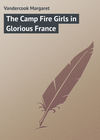Kitabı oku: «The Camp Fire Girls in After Years», sayfa 4
CHAPTER VII
A New Interest
IT is a far journey from the New Hampshire hills to the plains of the West.
Nevertheless a girl whom we once knew at Sunrise Hill is walking alone this afternoon on the rim of a desert and facing the western sun. It is scarcely fair to call her a girl, unless one has the theory that so long as a woman does not marry she retains her girlhood. Yet glancing at her as she strolled slowly along, no one could have guessed her to be more than twenty, though perhaps she was a little nearer the next decade.
Exquisitely dressed in a long, dark green broadcloth coat with a fur collar and small hat, she was a little past medium height and unusually slender. Her hair was so black that it had an almost somber look, and yet her eyes were vividly blue. Just now, having wandered a good many miles from the place where she was staying, she looked extremely tired and depressed. In no possible way did she appear to fit into her present surroundings, for without a doubt she was a woman of wealth and distinction. It was self-evident in the clothes she wore, but more so in the unconsciously proud carriage of her head and in the lines of her face, which was not beautiful and yet seemed to have some curious charm more appealing than mere beauty.
She stopped now for a moment to gaze with an appreciation that was almost awe at the beauty of the sinking sun. There was a glory of color in the sky that was almost fantastic; piles of white clouds seemed to have been flung up against the horizon like mammoth soap bubbles, tinted with every rainbow shade. With unconscious enthusiasm, the woman clasped her hands together.
"Why," she exclaimed aloud, "I was wondering what this scene reminded me of. It is dear old Sunrise Hill! What would I not give to be there in the old cabin tonight with Betty and Mollie and the others! But they must not know what has become of me until things are all right again. Both Betty and Mollie are too happy with their babies and husbands to worry over the old maids in the family. Sometimes, though, I feel that I should like to send for Sylvia." Then the wanderer turned and stared around her.
In every direction there were long waving reaches of sand with an occasional clumping of rocks, while growing near them were strange varieties of the cactus plant. Some of them had great leaves like elephants' ears, some were small and thick with queer, stiff hairs and excrescences, and among them, in spite of the lateness of the season, were occasional pink and crimson flowers with waxen petals.
Behind the wayfarer there was a trail which she must have followed from some nearby village, yet it was growing less and less distinct ahead, and certainly the hour was far too late for a stranger to be traveling alone so near a portion of the great Colorado desert.
Nevertheless the young woman at this moment turned and left her path. Walking deliberately for a few yards she seated herself on a giant rock, and leaning forward, rested her chin in her beautifully gloved hands.
"So like you, Polly O'Neill, even in your old age to have gotten yourself entirely used up on the first walk you were allowed to take alone!" she began aloud, giving a half despairing, half amused shrug of her thin shoulders. "I am not in the least sure that I know the way back to my hotel if it grows dark before I arrive there, and assuredly I am too weary to start for the present. And hungry! Heaven only knows when I was ever so ravenous! Now if I had only been a Camp Fire girl in the West instead of the East, doubtless I could at once discover all sorts of delectable bread fruit and berries growing nearby. But I don't feel I want to run any further risks at present."
So for the next half hour in almost perfect quiet Polly O'Neill remained seated. It would have been impossible for her to have done otherwise, for suddenly a curious attack of exhaustion had swept over her. It was not unusual of late, for indeed Miss O'Neill and her maid had established themselves in a small hotel near Colorado Springs in order that the well-known actress might recover from an attack of nervous exhaustion which she had suffered during her successful tour in the Western states. So Polly was quite accustomed to finding herself all at once too weary either to move or speak. But quite like the Polly of old she had just deliberately walked five miles without reflecting on her lack of strength or the fact that she must return by as long a road as she had come.
No, in spite of the fact that Polly O'Neill had in the last ten years made a great name for herself as one of the leading actresses in the United States, she was as thoughtless and impetuous as she had been as a girl.
Finally, however, with what seemed to require a good deal of effort she got up and moved, this time toward the east, but all the elasticity had gone from her. The sand was uncomfortably heavy, so that she dragged one foot after the other and her slender body seemed to wave like a stalk in the wind. But the worst of her difficulty was that her breath came in short, painful gasps. Unconsciously the effort which the business of walking required made Polly pay less strict attention to the path which she should have followed. But by and by, realizing that her way was less plain and that it was now quite dusk, she paused for a moment, put her hand to her side and then again seemed to be considering her situation. Whatever her decision, she must have accepted it philosophically, for this time, more deliberately, she sought another resting place. Fortunately not far away was a better shelter of rocks, half a dozen of them forming a kind of semicircular cave. Deliberately Polly crept toward their shelter and there removed her hat and tied her hair up in a long automobile veil. Then she lay down in the sand with the stones as a shield behind her and before her a wonderful view of the night as it stole softly over the desert.
Polly was not afraid and not even seriously annoyed. Life to her was but a series of adventures, some of them good and others less cheerful. She was not at all sure that she was not going to enjoy this one and she could not believe that it would do her any especial harm. She was sleeping outdoors for the benefit of her health in a small porch attached to her hotel bedroom. Perhaps the sand was less comfortable and clean than her bed, but then she had never before imagined so much sky and prairie. Moreover, there was no one to worry over her failure to appear except Marie, her maid. It was just possible that Marie might arouse the hotel and a searching party be sent to find her. In that case Polly knew that she would be glad to return to civilization. However, she did not intend to worry if no one came. Her hunger and thirst must be forgotten until morning.
Somehow, when the stars came out, in spite of the beauty of the night Polly found she could not manage to keep her eyes open. She was not exactly sleepy, only tired. For never in years had she had such an opportunity to think things over. How crowded her life had been, how full of hard work, of failure and success, yes, and loneliness! She was willing to confess it tonight to herself. How she would have liked to have had one of her old Camp Fire friends here in Colorado with her! Yet they were all too busy and she had not wished any one of her family to know how ill she had been. How much trouble she had always given all the people who cared for her ever since she could remember! Polly's conscience pricked her sharply. Why had she not married and settled down as her sister Mollie had suggested at least a hundred times? Because she would not give up her acting? Well, she need not have done this had she married Richard Hunt. But too many years had passed since their engagement had been broken for her to recall him. She had not even seen Mr. Hunt in the past five years, although they had occasionally acted in the same cities and at the same time.
Finally, however, when the famous Miss O'Neill actually fell asleep she was smiling faintly. For a vision had suddenly come to her of how shocked her sister Mollie and her brother-in-law, Mr. William Webster, would be if they knew that she was sleeping alone on the edge of a desert. But she was surely too near the village to be in any danger from wild animals and no one would undertake such a walk as hers had been at this hour.
Nevertheless, wisdom should have prompted an old Camp Fire girl to have found twigs enough to have started even a miniature camp fire. But the edge of a desert is scarcely the place where wood abounds and the fact is, though she had thought of it, Polly had been too tired to make the necessary effort. For goodness only knows how much farther she need have wandered before coming to an oasis of shrubbery or trees.
When at last Miss O'Neill opened her eyes actually it was broad daylight and standing before her was a figure that almost fitted into her dream. For the girl was just about the age of the group of friends who had once lived together in a log house in the woods, and all night she had been dreaming of Sunrise Cabin.
Nevertheless her visitor bore no other resemblance to them, so that the distinguished lady rubbed her eyes, wondering if she were yet awake and how the girl could have come so close up to her without her hearing.
A glance explained this, for the intruder was barefooted and her legs and feet were so brown and hard they appeared totally unfamiliar with shoes and stockings.
She was staring so hard at Polly that she seemed scarcely conscious of anything except her own surprise.
With an effort Miss O'Neill sat upright. She did not feel tired now in the least, but gloriously rested and strengthened from her wonderful night out of doors in the clear, pure air. But of course she must explain her situation to the little girl before her, although she would have preferred her discoverer to have explained herself.
In spite of being about fourteen years old, this child had on only a thin yellow calico frock, and it was late October. Her hair was perfectly straight and Polly might have thought her an Indian except that it was light brown in color, although a good deal stained by wind and sun. However, the girl's eyes were a kind of greenish gray in shade and her features were delicately modeled. But she had a peculiar and not an agreeable expression.
"I wandered away from my hotel last evening and was not able to return, so I slept here all night. How did you happen to find me?" Polly began, feeling that some one must start a conversation in order to persuade her companion to cease her almost frightened staring. Of course Polly appreciated that she herself was not looking her best, but there was no reason why she should excite so much curiosity.
Notwithstanding she received no answer. With a slight gesture of annoyance Miss O'Neill stood up. After all, she did not feel as energetic as she had thought and it was undoubtedly a long walk back to her hotel.
"Do you live anywhere near here? I am both hungry and thirsty. If you could find some one to help me I should be most grateful," Polly said as politely as if she had been speaking to a friend. For if the girl was afraid of her she wished her to forget her timidity.
But instead of replying the strange child stared harder than ever for half a minute, and then before Polly could speak again or touch her she was off, running across the sand like a deer, without a backward glance.
Miss O'Neill watched her for some time until she vanished into what appeared at this distance to be a clump of trees. Then she deliberately set out to follow her. The child must have come from some place nearer than the village where she was staying. In almost any kind of settlement she would be able to find a horse to take her back to her hotel.
CHAPTER VIII
"Bobbin"
ALL her life Polly O'Neill had felt a curious shrinking from physical cruelty, and growing older had not made the least change in her feeling. She had never talked about it, but had always been fearful that at heart she was a coward. The Camp Fire girls used to laugh at her because, of course, she had learned to do all of the things that their rules required without feeling any possible nervousness. But then no one of them understood what physical cruelty might mean and possibly might never see an exhibition of it.
Yet nothing was farther from her own mind at the present moment than this fear. She had come in about fifteen minutes' walk to a clump of cottonwood trees by a small stream of water, and there in their midst stood a crude two-room shanty with a bare space of ground in front of it and a lean dog sitting in a patch of sunshine.
But the sight that froze Polly's blood and made her stand suddenly so still that she might have been a wooden image was the figure of a man with a long whip in his hand, such as one might have used in driving cattle. And this whip was now whirling and stinging through the air and twisting itself about the body of the little girl who had been the first vision that Miss O'Neill's eyes had rested upon on waking that morning.
But the strangest thing of all was that the child was making no outcry and showing no effort to run away. Indeed, she stood perfectly still, hugging half a loaf of bread in her arms.
Polly made an inarticulate sound which she thought was a loud cry: "Stop!" But the man had not seen her approach and was too occupied with his hateful task to hear her, and to her intense shame she felt all at once desperately afraid of him. She was so far from any one she knew, she had so little physical strength and this man was so much more brutal than any one she had ever seen before in her life. Perhaps he would cease hurting the child this instant.
Then, without in the least knowing when nor how she had accomplished it, Polly rushed forward and seizing the man's thick wrist in her own slender fingers, clung to him desperately, while the thong of the whip curled and fell in a limp fashion about her own shoulders.
Too surprised to speak, the man took a step or two backward. In the course of her stage career Polly had acted a number of tragedy queens; and notwithstanding her slightly rumpled appearance at this moment, she had never looked the part better than now. Her thin figure was drawn up to its fullest height, her Irish blue eyes flashed Celtic lightnings. She even stamped her foot imperiously.
"You beast!" she exclaimed. "What do you mean by striking a little girl in that cruel fashion? I'll have you arrested! I don't care in the least if you are her father or what she has done, you have no possible right to be so brutal."
The man had dropped his whip to the ground and Polly now stooped and picked it up. It was absurd of her ever to have dreamed she could have been frightened by mere brute strength. The man was a good deal more afraid of her for the instant. The sudden apparition of a fashionably dressed young woman, appearing out of nowhere and springing upon him in such a surprising fashion, had destroyed his nerve.
"I wasn't doin' nawthin I hadn't a right ter," he growled. "That young 'un is allers stealin' somethin'. I caught her red-handed running off with that there loaf of bread."
For the first time since her arrival on the scene Polly O'Neill turned toward the girl. She was still staring at her with almost the same expression she had worn earlier in the day. But somehow something in her look touched Polly, brought her sudden inspiration.
"Why," she exclaimed with a break in her voice, "I believe she was bringing the bread to me. I told her I was hungry just a little while ago."
There was no one in the world who could be sweeter or simpler than Polly O'Neill when her feelings were deeply touched. This had always been true, even as a young girl, and of course, as she had grown into a famous woman, her charm had deepened. Now she put her arms about her new friend's shoulders. "You were going to give the bread to me, I'm sure. Thank you." Oblivious of the fact that the little girl's dress was exceedingly dirty and that her face was far from clean, Polly leaned over and kissed her.
Then she turned to the man. "If you will get a horse and drive me to my hotel I will pay you well for it," she explained.
In reply the man nodded and moved away, so that Polly was once more left alone with the girl.
It suddenly occurred to her that the child had never spoken since their meeting. Could she possibly be deaf and dumb? That might explain her strange expression.
"What is your name?" Polly asked gently.
Still the girl stared. Miss O'Neill repeated her question.
Then the girl, picking up a stick from the ground, slowly and laboriously printed in big letters, such as a child of six might have made, the word "Bobbin."
"Bobbin?" Polly repeated the name aloud as she read it. What an extraordinary title! One could scarcely call it a name.
"Is that the only name you have?" she inquired again, wondering at the same time how it was possible for the little girl to understand what she said without being able to reply. But Bobbin bowed her head, showing that she had understood. In some fashion she must have learned the lip language. Yet it was curious why if the girl had ever been sent to school she had learned nothing else. She appeared the veriest little savage that ever lived so close to wealth and civilization.
Polly sought in her mind to find out what she could do or say to show her gratitude. She had a sudden feeling that she could not turn her back upon the girl and leave her to her wretched fate, and yet of course the child had no claim upon her. It was something in the expression of Bobbin's eyes that seemed to haunt one.
With a slight, unnoticeable shrug of her shoulders, as though giving up the problem as too much for her, Polly now slipped her hand into her pocket, drawing out her purse bag. Opening it she found a large silver dollar, such as one uses in the West.
"Won't you buy yourself something from me?" she asked, trying to speak as distinctly as possible. She had not observed that in taking out the money she had carelessly dropped a handkerchief from her bag.
With a fleeting expression of pleasure the girl accepted the gift, but the next instant, when Polly turned to watch the man who was now approaching her with a lean horse hitched to a cart, she swooped down toward the ground and picking up the crumpled white object thrust it secretively inside her dress.
Five minutes after, when Polly and the man had started for Colorado Springs, Bobbin remained in the same position, watching them until they were out of sight. Then she began eating the neglected bread.
Upon arriving safely at her hotel, Miss O'Neill discovered that the news of her disappearance had been spread abroad by her frightened maid, and that a thorough search was being made for her. For although Polly had been trying to live as quietly as possible in a small, obscure hotel, the fact of her visit was well known to hundreds of people. You see, at this time in her life not only was her name celebrated from one part of the country to the other, but her face was equally familiar.
Through her maid, Marie, Polly was told that a gentleman, whose name she had not learned, had been particularly kind and interested in seeking to find her. So as soon as she rested she had every intention of inquiring his name and thanking him personally. But by late afternoon, when she finally dressed, this was impossible. Evidently the man did not wish to be annoyed by her thanks, for the message brought her was that on hearing of her safety he had suddenly left the village.
However, Polly was able to acquire some actual information about the girl she had seen earlier in the day, for "Bobbin" was apparently a well-known character in the famous Western resort. She was a little stray daughter of the place. Years before, the mother had come to Colorado from some city in the South and had died. Afterwards no one had ever claimed the child.
So the town had taken care of her, sent her to school and tried to teach her to talk. She was perhaps not entirely deaf, although no one exactly understood her case. But the girl was a hopeless little rebel. In no place would she stay unless kept there by iron bars. She seemed to have an unconquerable desire to be always out of doors, and in the brilliant Colorado climate this was nearly always possible. Recently she had been living with some gypsy people, who had established themselves in a temporary shanty at some little distance from the roads usually followed by sightseers. So Miss O'Neill had certainly wandered from the beaten track. Nevertheless she need not make herself unnecessarily unhappy over "Bobbin," for the girl would again be brought back to school as soon as she could be captured.
Yes, her name had been Roberta, an old-fashioned Southern name, and then in some way it had been shortened to Bobbie and now Bobbin. The child had a last name, of course, but the woman who told the story to Miss O'Neill had either never heard the mother's name or else had completely forgotten it.
Late that night in reflecting over her adventure Polly wished that she and Betty Graham could have changed places for a week or so. For Betty would certainly do something for the unfortunate Bobbin to make life happier for her, as she had a kind of genius for looking after people. Her Camp Fire training had taught her a beautiful sympathy and understanding. But Betty must have been made that way in the beginning, Polly concluded with a sigh and a smile. She had no such gift herself. The girl's story, fragmentary as it was, interested her, but there could be no possible point in undertaking to interfere with the child's future.
Nevertheless, try as she might, all night it was impossible for the famous actress to get the half tragic, half stupid figure of Bobbin out of her vision.










